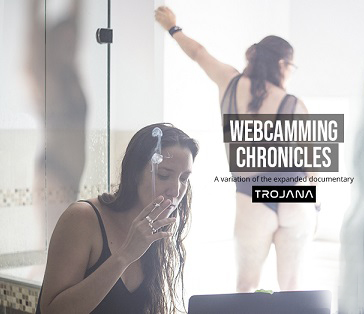Trojana: Web Chronicles

Produced by Defiant Reality: Theatre for Change & LACRA: Laboratorio de creación en artes, Colombia/France
Voila! Europe Festival, London | November 12-21, 2020
Nick Awde | THE X REPORT
Trojana is very much an ongoing process, a ‘live art documentary’ where the research of Maud Madlyn and Andrés Montes Zuluaga into the webcam porn industry gets different outings in different guises along the way.
For the Voila! 2020 festival audience, Madlyn and Montes have created a series of daily bulletins that lead up to the performance session itself – a Zoom show live from their base in Cali Colombia (they have Spanish, French and English versions) that is basically a post-show Q&A without there actually being a show. Which in a postdramatic world makes sense.
So… the Webcamming Chronicles are mainly nine emailed links to YouTube pieces, tasks and psychological surveys that lure you into this corner of the sex internet. You decide whether you’re a client or webcammer and then, depending on your answer, in your inbox pops up personalised application content targeting you (in a good way, of course).
Each audio piece takes a different approach. Labyrinth is an artily sparse info-intro to the webcam industry listing the people, emotions and consequences of this global industry. Chat screengrabs illustrate Profusion, a string of fantasy-obsessed sessions from the client’s vantage point. Verbatim flipsides of each other are Cali Calling, a phone conversation with a man who matter of factly describes setting up a webcam house as if it’s a battery farm, countered by Under the Skin, a harrowing account of the job from the people who do it.
Eyes is a disturbingly languid monologue, based on a true story about a wealthy professional who almost gets away with a hideous sex murder. Summing it up is A Monster Too Human, video of an elegant man in an elegant house with a geometric crow’s head and who – part absurdist, part satanic – lectures us, wineglass in hand, on the monstrosity in humanity that comes from the dark side of sexuality.
As pointed out, the Zoom itself is a talk session not a performance – except obviously it is, since it’s part of what the makers explain as the non-linear journey of their ‘expanded documentary’. It’s clear that Madlyn and Mendes’ material, documentation and field investigations are geared to exploring society through the prism of gender and sexual violence and misogyny – amplified and exemplified now by the explosion in the virtual, profitable world of webcamming. They share grim statistics of rape and paedophiles – and similarly grim tales of global exploitation ensue.
This being where high art meets issues meets theatre, we the audience are invited to go in and piece all the bits together – the ‘application’ process of the emails means that we cannot stand as mere spectators but, armed with our own awakening and possibly research, we are now empowered – indeed required – to add our own reactions and ask ourselves are we monsters regardless?
The problem with this version of Trojana is the question of what’s real and what isn’t. I’m not a fan of delving too far into issues-driven theatre – that search for authenticity becomes a game and the slip into voyeurism and smugness is all too easy, plus playing hide and seek with the audience is hard to maintain and removes agency. Without a benchmark from Madlyn and Mendes, it’s not clear what the audience as a group has learned about sex work and our complicity in it. Maybe that’s the point.
Viewed purely as a cumulative work of performance, there is value here, made more intriguing since each strand of investigation generates a piece in a different genre or style. But again, the agency is implied and not stated, the ‘why’ isn’t clear for us to glue all this together in three-dimensional form.
Ultimately this multi-levelled conceptual work places the onus on the audience to produce a finale, but this isn’t a Mark Thomas show. The Q&A, at least on this night, turned out to be more of a guessing game where the duo oddly appeared to engage with the questions yet didn’t connect or commit to full answers (odd given their declared experience in remote work), leaving the audience floating, almost audibly wondering where to go to next. Maybe, again, this was the point.
On the other hand, the language thing renders attempts in this particular session at assessment unfair. On a practical level, one half of the team is excluded because Montes Zuluaga seems not to be a fluent English speaker – Madlyn gamely translates for him but without any other strategy the duo falter and they do need to work on improving their communications strategy for a wider audience who aren’t already converted.
Sticking to the linguistics, there’s a whole philosophical underpinning to the approach and interpretation that culturally makes sense in French and Spanish and yet an English-speaking audience will mostly draw a blank (exquisitely reflected in the wandering wordcount of what’s become an essay here in place of a concise review). Philosophical musings on raw subjects work fine if they mainline to the gritty stage, but bare musing will work only for a rarefied few, even if bolstered by the wealth of material evident in Trojana.
Ultimately, this is performance art I’m glad to have experienced. But there remains the caveat that the bedrock is missing of how far Madlyn and Mendes were/are in the webcam sex workers’ world. There’s a massive disconnect in the fact that the assumptions we make aren’t actually based on anything solid. Resolving that would allow a conclusion to the Zoom – which is where the pair needed to strike back with answers to the questions they were fishing for instead of deflecting them. Maybe, just maybe, that’s the point, i.e. we’re supposed to ask them to do stuff for us. But then maybe we can’t do that if we’ve elected to be sex workers not clients. See what I mean?
I’d like to see more. I’d like to see the live show, whatever version it’s in at the moment, and I’m curious to see how those French and Spanish Zoom performances turned out too.
